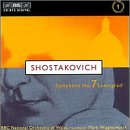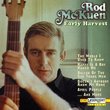| All Artists: Dmitri Shostakovich, Mark Walker, BBC National Orchestra of Wales, Mark Wigglesworth Title: Shostakovich: Symphony No. 7 "Leningrad" Members Wishing: 2 Total Copies: 0 Label: Bis Original Release Date: 1/1/2005 Re-Release Date: 8/7/2000 Album Type: Import Genre: Classical Styles: Historical Periods, Modern, 20th, & 21st Century, Symphonies Number of Discs: 1 SwapaCD Credits: 1 UPCs: 789368551620, 7318590008737 |
Search - Dmitri Shostakovich, Mark Walker, BBC National Orchestra of Wales :: Shostakovich: Symphony No. 7 "Leningrad"
 | Dmitri Shostakovich, Mark Walker, BBC National Orchestra of Wales Shostakovich: Symphony No. 7 "Leningrad" Genre: Classical
|
Larger Image |
CD DetailsSimilarly Requested CDs |
CD ReviewsWigglesworth: a star is born Bruce Hodges | New York, NY | 02/05/2002 (5 out of 5 stars) "In April 2001, I was lucky to hear Mark Wigglesworth conduct this piece - without a score - in Amsterdam's Concertgebouw, with the Netherlands Radio Philharmonic Orchestra. The sold-out Sunday morning concert will always remain one of my favorite live music experiences.Even if you are a fan of other (rightly praised) versions, such as Bernstein/Chicago or Haitink/London, Wigglesworth's strong vision is compelling, and the BIS engineers have outdone themselves. In the first movement, the "invasion" sequence is as savage and relentless as any I have heard. Just don't turn up the volume too much during the whisper-quiet beginning, or you will be blasted into another dimension during this section's climax.Strong moments are everywhere throughout, and by the end of the piece, you will be cheering as this gargantuan work reaches its tumultuous conclusion. Wigglesworth seems undaunted by anything in the score, and the BBC orchestra delivers powerful playing to match. An outstanding disc by a major young conductor." Worth Owning (for Now) B. R. Merrick | 10/20/2007 (4 out of 5 stars) "I have been through more than a dozen recordings of this symphony, and they are all sub-par. Out-of-tune, muffled, sloppy, the list goes on and on. I don't understand what could be so difficult about getting it right. Even Neeme Järvi's recording with the Scottish National Orchestra doesn't do it justice. And sadly, this recording also has some oddities. The woodwinds and French Horns are remarkably flat in their fortissimo entrance in the second movement, and the conductor twice decides to use a little artistic license for grand slurs in the high strings during the third and fourth movements, but there are charms on this recording that make it worth much more than all the other insufficient efforts. The march in the first movement finally gets the treatment it deserves. It starts off with an almost inaudible pianissimo, but wait for the sudden burst from the Horns when the clarinets enter with their screeching rendition of the theme. The conductor showcases the relentlessness of the theme as it moves from its benign entrance to its horrific climax. The rest of the symphony is played in like manner. With Shostakovich, it is vitally important to get the pianissimo passages right, so that the eeriness and loneliness are brought out. With the high contrasts in this recording, thanks not only to the conductor's interpretation but also the superb technical aspects, the terror of this war-time symphony is just as evident as the triumph. I will stand by this assessment even when the best recording is found... If ever." A triumph in Wigglesworth's cycle, devoid of bombast and rhe Santa Fe Listener | Santa Fe, NM USA | 06/16/2009 (5 out of 5 stars) "The Gramophone has praised Wigglesworth's Shostakovich to the skies, but even if that's provincial bias, any conductor who can catch the spirit of the problematic Seventh Sym. must be respected. Portions of every movement verge on the banal and rhetorical, and the famous invaders' march in the first movement is extremely hard to bring off without sounding like patriotic kitsch. The now legendary Evgeny Mravinsky overcame all odds and produced a reading of sering integrity. Bernstein also knew the secret to unlocking this gargantuan work. Does Wigglesworth?
He takes a broad approach, adding a minute or two to each movement beyond the usual. He uses this extra time for reflection; clearly he wants to bring out the quiet dignity underlying the bombast. His pacing is very effective at the outset of the march, which for once doesn't sound jaunty (Bartok's parody in the Concerto for Orchestra slides jauntiness into buffoonery). the pianissimo dynamic makes you lean forward to capture the tune when suddenly there are startling jolts of intrusion from winds and brass -- very effective. The BBC's Welsh orchestra isn't virtuosic, but Wigglesworth uses a wide range of instrumental color. The eventual climax achieves a glorious dignity worthy of Mravinsky, and Bis's sonics are far better than anything the Soviet conductor enjoyed. I've noticed from other performances that Wigglesworth falls back on the quiet music in these symphonies as his base line, as he does here in the second movement, which begins almost gravely. The japery of the middle section comes as a rude intrusion, and it's just as effective as before. The third movement is even more successful as a quiet meditation. The tumultuous middle section, which strikes me as the most empty part of the symphony, is passed through without mishap. Wigglesworth is attuned to the rawness of these passages; he's not so embarrassed that he tries to glibly skate through. The finale is shaped like the other movements, with subdued dignity in the quiet sections and raucous thrills in the climaxes. I was surprised by how effectively the whole thing runs. This was the first installment of Wigglesworth's complete cycle, recorded in 1997. It doesn't compete with the heavy hitters in terms of technical prowess, and yet the young British conductor makes up for that with his total belief in the music. I was converted. ." |

 Track Listings (4) - Disc #1
Track Listings (4) - Disc #1

![Seussical [2000 Original Broadway Cast]](https://nationalbookswap.com/cd//m/02/4802/514802.jpg)